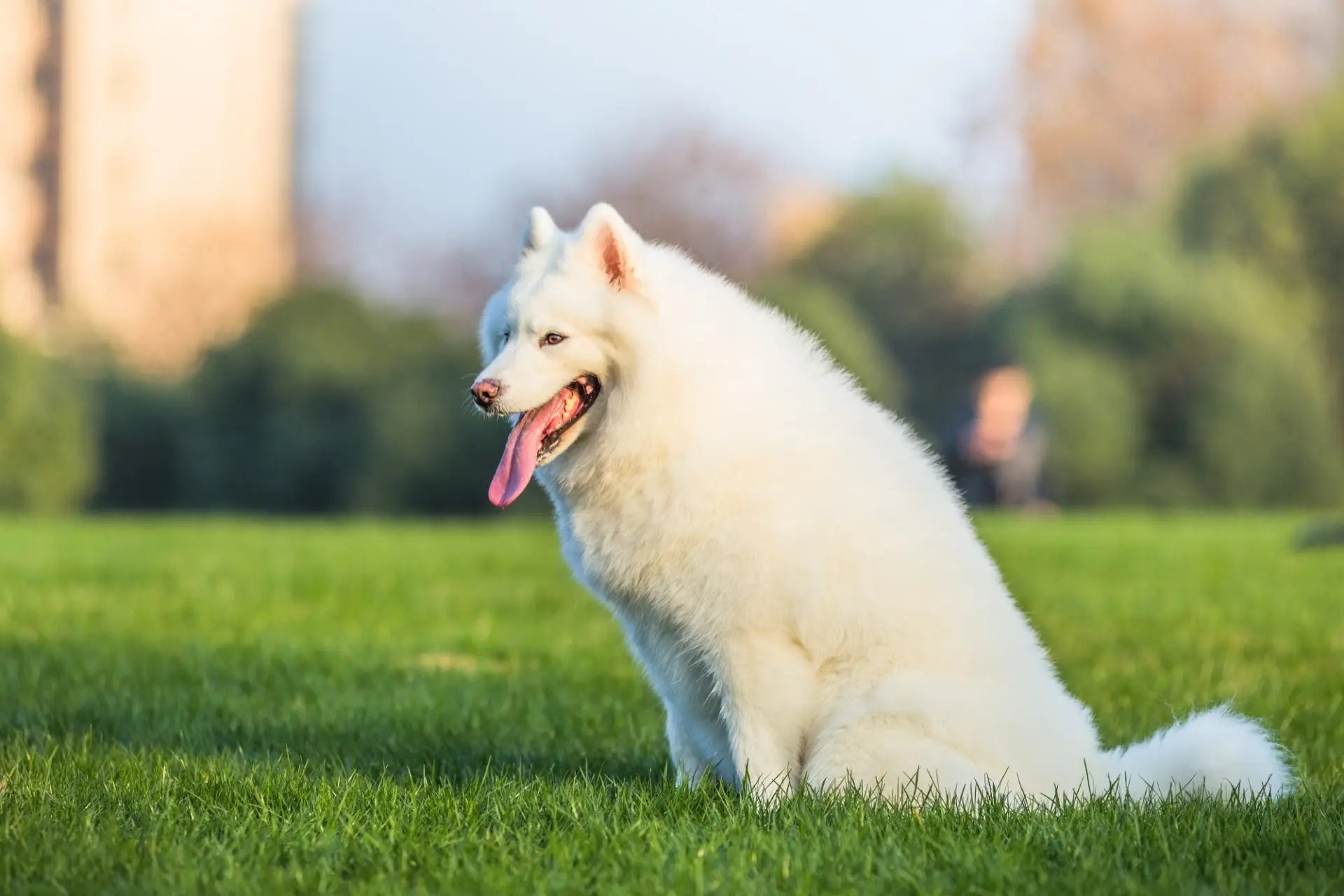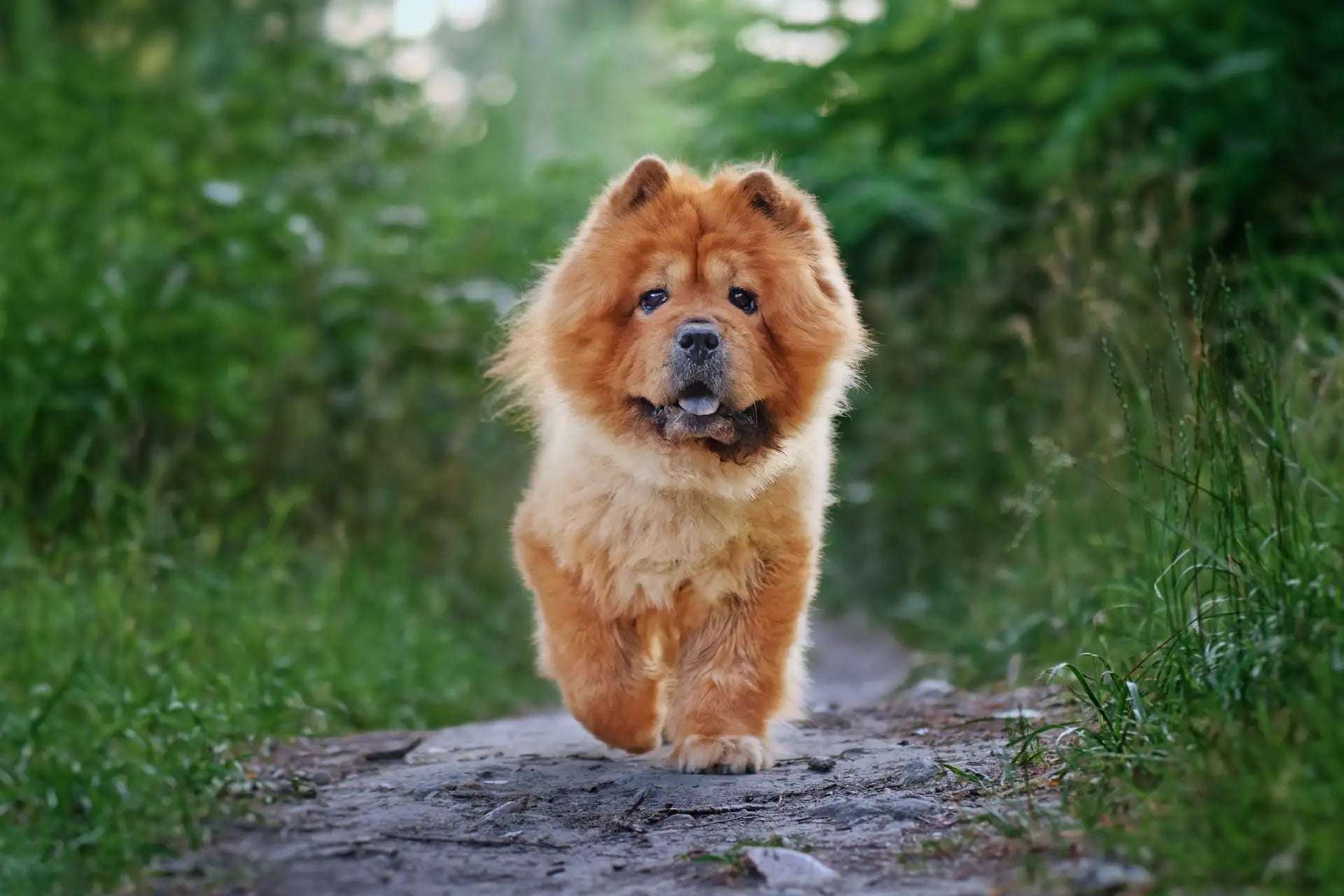
Samoyed Dog Breed: A Complete Owner’s Guide for Happy Dogs
Known for their beautiful white coats and ever-present "Sammy smile," Samoyeds are one of the most striking and affectionate dog breeds you can find. Originally bred for herding and pulling sleds in cold climates, the Samoyed has found a loving place in many homes around the world, including Australia.
In this guide, we will answer the most common questions about Samoyeds to help you decide if this friendly and energetic breed is the right companion for you.
Quick Facts Overview
|
Trait |
Details |
|
Size Category |
Medium to Large |
|
Height & Weight |
Height: 48–60 cm; Weight: 20–30 kg |
|
Coat Type & Colours |
Dense, double-layered coat; primarily white, cream, or biscuit |
|
Energy Level |
High |
|
Origin |
Siberia |
|
Grooming Needs |
Very High |
|
Temperament |
Friendly, alert, gentle, social |
|
Trainability |
Moderate to High |
|
Compatibility |
Great for families and active individuals |
|
Lifespan |
12–14 years |
Breed Origins and History
The Samoyed breed traces back thousands of years to Siberia, where they were bred by the Samoyede people. These dogs were essential companions—pulling sleds, herding reindeer, and keeping their humans warm by sleeping beside them. Their thick coats, cheerful demeanor, and hardworking nature allowed them to thrive in the harsh Arctic environment. Today, Samoyeds continue to win hearts worldwide with their beauty, intelligence, and loving spirit.
Personality and Temperament
Samoyeds are the definition of a happy, social breed. They adore being around people and often display an infectious enthusiasm for life. Nicknamed the "smiling sled dog," they maintain a positive attitude but can be mischievous if bored. They are friendly to everyone—family, strangers, other dogs—and make excellent family companions. Their strong social nature means they do not do well left alone for long periods.
Trainability and Intelligence
Samoyeds are intelligent and willing learners, but they have a streak of independence. They respond well to positive reinforcement and enjoy training sessions that are fun and varied.
-
Early socialisation and obedience training are crucial
-
Gentle, reward-based methods work best
-
Short, energetic sessions maintain interest
-
A sturdy training harness ensures safe handling
-
A treat bag helps with quick rewards during training
Exercise and Activity Requirements
A working dog at heart, the Samoyed needs daily exercise to stay physically and mentally healthy.
-
1–2 hours of exercise daily
-
Enjoys long walks, jogging, hiking, and pulling activities
-
Mental stimulation like trick training or puzzle games is essential
-
A comfortable hands-free lead makes active outings easier
-
Great candidates for dog sports like agility or rally obedience
Physical Characteristics
Samoyeds are famous for their thick, fluffy coats and bright expressions.
-
Height: 48–60 cm
-
Weight: 20–30 kg
-
Coat: Dense, weather-resistant double coat
-
Colour: Predominantly white, but cream and biscuit shades are also common
-
Best fitted with medium to large dog gear
Living Environment Suitability
Samoyeds adapt well to various homes but need space and family interaction.
-
Best suited to homes with yards or access to regular outdoor activities
-
Apartment living is possible with very high daily exercise commitment
-
Thrive when included in family activities and given purposeful jobs
-
Sleep comfortably on a orthopaedic dog bed
-
Secure them during car travel with a dog car harness
Grooming and Maintenance
The Samoyed’s coat is beautiful but high maintenance.
-
Brush at least 3–4 times weekly; daily during shedding season
-
Bathe every 6–8 weeks or when necessary
-
Regularly check and clean ears to prevent infections
-
Trim nails monthly to avoid overgrowth
-
Use a strong but gentle soft collar for everyday wear
Common Health Issues
Samoyeds are generally healthy but prone to some breed-specific concerns.
-
Common issues: hip dysplasia, progressive retinal atrophy (PRA), hypothyroidism, diabetes
-
Maintain proper weight and joint care
-
Provide supportive bedding like an orthopaedic dog bed
-
Annual vet check-ups help detect early issues
Diet and Feeding Guidelines
Good nutrition supports the Samoyed’s energy levels and coat health.
-
Puppies: Feed 3 meals daily with a focus on large-breed puppy formulas
-
Adults: Feed twice daily, adjusting portions to maintain healthy weight
-
High-protein, omega-rich diets benefit coat and muscle tone
-
Fresh water should always be available
-
Portable food and water bowls are ideal for outdoor adventures
Compatibility with People and Other Pets
Samoyeds are famously social and do well with people and other animals alike.
-
Great with children and other dogs
-
Early socialisation builds their confidence around strangers
-
May have a mild prey drive—supervise around small animals
-
Use a coupler lead for multi-dog walks
Behavioural Issues and Management
Without enough attention and exercise, Samoyeds can develop habits like barking or destructive chewing.
-
Provide daily mental and physical enrichment
-
Redirect boredom through training or play
-
Use a no-pull harness for polite lead manners
-
Keep a rotating supply of durable toys to prevent boredom
Essential Gear for Samoyeds
Walking and Training
Comfort and Rest
Fun and Enrichment
FAQs: Samoyed
1. Is a Samoyed a good family pet?
Yes, Samoyeds are known for being affectionate, gentle, and friendly, making them excellent family pets. They are usually very good with children and enjoy being part of daily family life. However, their playful energy means they thrive best in active households.
2. Is Samoyed a high maintenance dog?
Samoyeds are considered high maintenance mainly because of their beautiful thick coat. They require regular grooming, including brushing several times a week to prevent matting and reduce shedding. They also need consistent exercise and mental stimulation to stay happy.
3. Can Samoyeds live in Australia?
Yes, Samoyeds can live in Australia, although owners need to be mindful of the heat. Their thick double coat was designed for cold climates, so they need access to cool, shaded areas, plenty of water, and exercise during the cooler parts of the day in warmer regions.
4. Are Samoyeds aggressive?
Generally, Samoyeds are not aggressive. They are known for their friendly and sociable nature. With proper socialisation and training, they are usually very good with people and other animals. Poor handling or a lack of training, however, can lead to behavioural problems like any breed.
5. Are Samoyeds good house dogs?
Samoyeds can be good house dogs as long as they get enough exercise and mental stimulation. They are social dogs that like to be near their family. A Samoyed that is well-exercised and mentally engaged will usually be calm and well-mannered indoors.
6. How much exercise does a Samoyed need?
A Samoyed typically needs at least one to two hours of exercise per day. They enjoy activities like long walks, playtime in a secure yard, and even structured activities such as obedience or agility. Regular exercise helps prevent boredom and destructive behaviours.
7. Do Samoyeds shed a lot?
Yes, Samoyeds are heavy shedders, particularly during seasonal changes when they blow their coats. Regular brushing, at least a few times a week, helps manage the shedding and keeps their coat healthy.
8. Are Samoyeds prone to health problems?
While generally healthy, Samoyeds are prone to certain conditions such as hip dysplasia, progressive retinal atrophy, and diabetes. Choosing a reputable breeder who health-tests their dogs can help reduce the risk of inherited health issues.
9. Do Samoyeds bark a lot?
Samoyeds are quite vocal and may bark to alert you to new people or when they are excited. They are not constant barkers without reason, but without proper training and stimulation, their barking can become excessive.
10. Do Samoyeds suffer from separation anxiety?
Samoyeds form strong bonds with their families and can suffer from separation anxiety if left alone for long periods. Providing mental stimulation, training them gradually to be comfortable alone, and ensuring regular companionship helps manage this behaviour.
Final Thoughts
Samoyeds bring a wonderful combination of beauty, loyalty, and spirited personality into the lives of those who welcome them. While they do require regular grooming and plenty of exercise, their affectionate nature and friendly disposition make the effort worthwhile.
If you are considering adding a Samoyed to your family, understanding their needs is key to building a strong and lasting bond with this remarkable breed.
Ready to equip your Samoyed with the best?
Visit EzyDog for premium gear designed for active, spirited dogs like the Samoyed.




Leave a comment
This site is protected by hCaptcha and the hCaptcha Privacy Policy and Terms of Service apply.